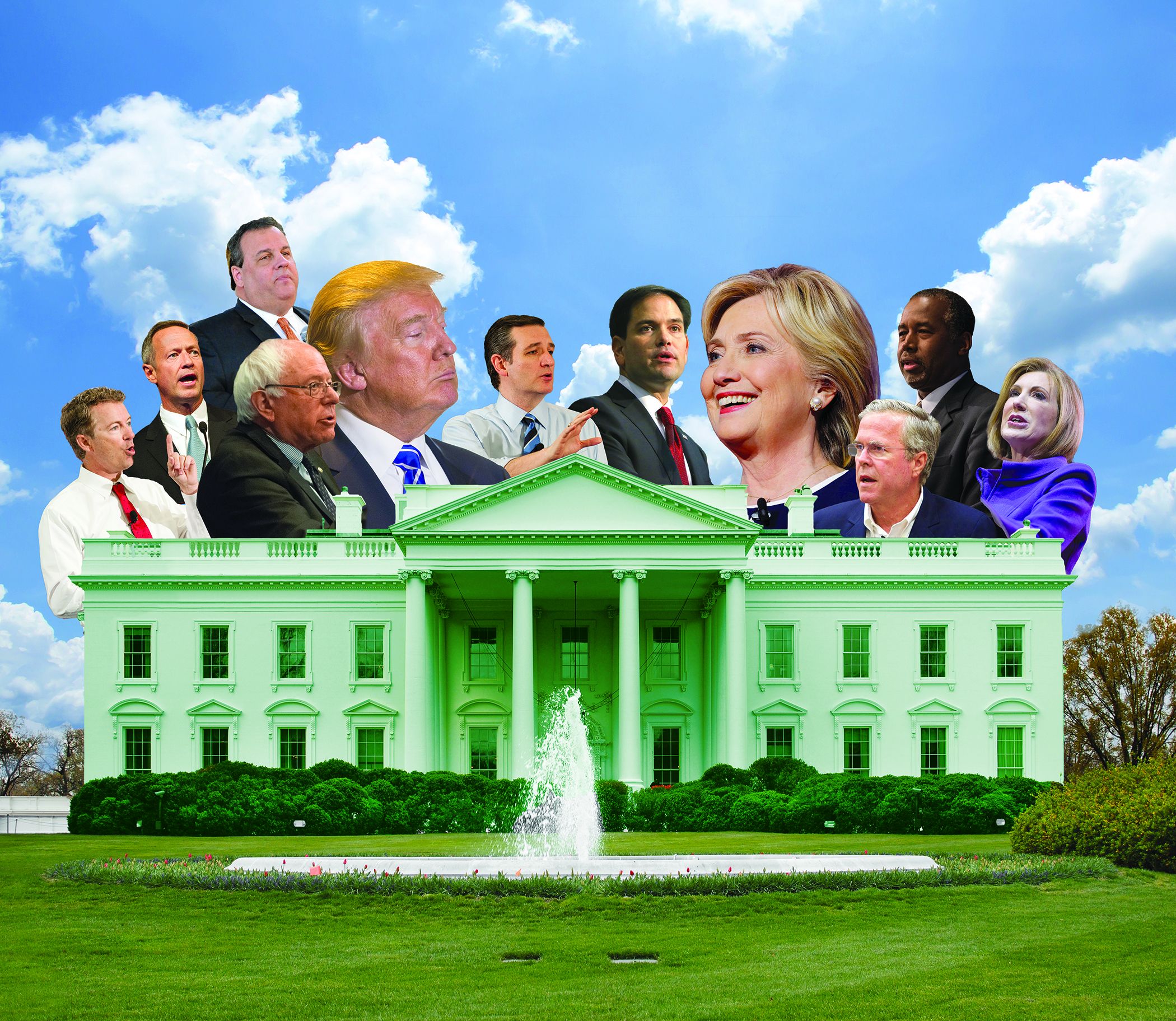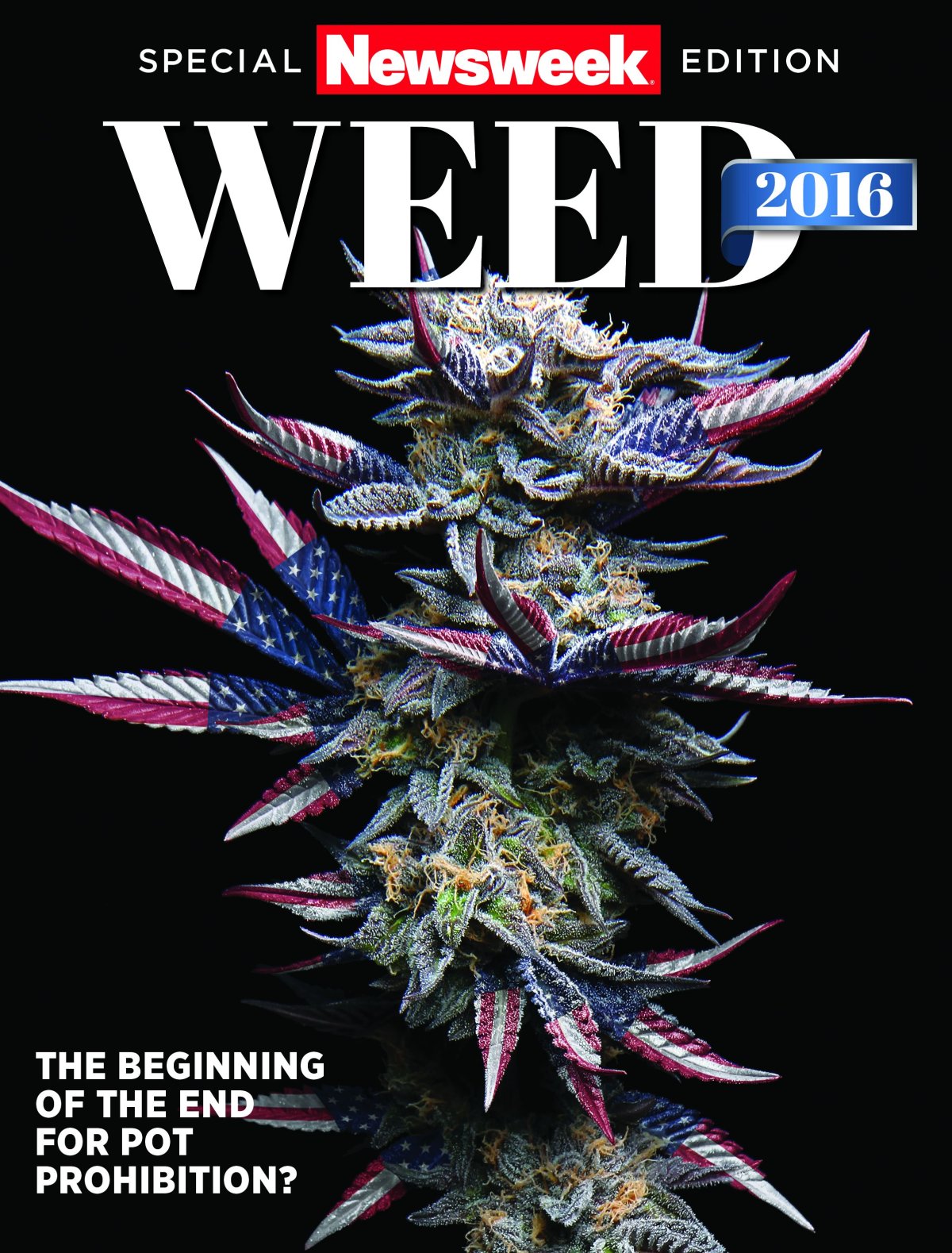
This article was excerpted from Newsweek's Special Edition, Weed 2016: The Beginning of the End for Pot Prohibition.
For the past four years, the cannabis legalization movement has sprouted from 420-friendly states such as California and Alaska to take over headlines and ballots in even more conservative swing states such as Missouri and Ohio. Given the explosion in media attention marijuana has received, you'd expect the men and women seeking the nation's highest office to be hammering home their stances on cannabis policy to the American people. But in place of in-depth discussion and policy papers, virtually every candidate can only offer vague first drafts of a coherent viewpoint on how their administrations would deal with a growing industry and social movement currently prohibited by federal law. "For almost 100 years, marijuana has been such a taboo issue," says John Hudak, a fellow in government studies at the Brookings Institute who has analyzed the political ramifications of the cannabis legalization movement. "Even when public opinion shifts there's still this tradition of not wanting to talk about the issue."
That's a problem for the thousands of people in the nascent legal cannabis industry who are one DEA raid away from bankruptcy, something a future president intent on enforcing the federal laws on the books could easily orchestrate. Even a continuation of the Obama administration's hands-off approach to the states with legalized marijuana could leave legitimate cannabis businesses in the lurch, as banks refuse to lend money to an industry that is illegal in the eyes of the federal government. On the other hand, an executive determined to support the legalization experiments in Colorado, Washington and other states could be a game changer for the industry. "A president could make sure he or she had heads of the DEA and FDA, as well as an attorney general, who were willing to end prohibition," says Hudak. With the right appointees, the administration could remove cannabis from the list of controlled substances (a process called "descheduling") without any action from Congress (see below for more details on how this could happen).
The two leading candidates in their respective parties at press time, Democrat Hillary Clinton and Republican Donald Trump, have provided few clues on their potential cannabis policies in campaign speeches and media interviews. "Clinton has essentially said 'I want more money and research into the uses of marijuana, and if a state has legalized and is regulating cannabis, then I'm not going to bother it,'" says Hudak. By and large, this would be a continuation of President Obama's wait-and-see policy regarding states that have legalized cannabis to varying degrees, a position that doesn't differ too much from Trump's. The real estate mogul-turned political phenomenon has gone on the record supporting medical marijuana, but said at a political rally in Nevada in October that legalization "should be a state issue, state-by-state." Still, Trump's evolving views on legal cannabis can't inspire much confidence in voters as they try to predict what tack he would take as president. When asked at the Conservative Political Action Conference in June whether Colorado's legalization of cannabis was "good or bad," the candidate responded, "I'd say it's bad. Medical marijuana is another thing. But I think it's bad, and I feel strongly about it." "He's had a remarkable transformation on this issue in a very short time, and hasn't really been called out on it," says Hudak. "My guess is that at the end of the day, he's going to take the approach almost any Republican is going to take if elected, and that is not to spend too much time on the issue."
A few candidates have shown more willingness to tackle the question of how they would enforce—or reform—the federal prohibition on cannabis. Kentucky Senator and Republican Rand Paul, darling of the GOP's libertarian wing, said at the Republican debate in September, "I don't think that the federal government should override the states. I believe in the 10th Amendment, and I really will say that the states are left to themselves." According to Hudak, Paul's words stem from a long-held philosophy. "It's not politics. He's a believer," he says. New Jersey Governor Chris Christie holds the opposing view on states' rights to legalize a substance banned on the federal level. "If you're getting high in Colorado today, enjoy it," he said a town hall meeting in New Hampshire. "As of January 2017, I will enforce the federal laws." The governor's uncompromising stance on cannabis may not endear him to the nation's budtenders and their customers, but according to Hudak, it's a message that sounds like sweet gospel to cultural conservatives who otherwise would have little reason to support the man who famously embraced President Obama in the wake of Hurricane Sandy.
The strongest statement made by a candidate may belong to Senator Bernie Sanders, the Democrat from Vermont, who in November introduced the Ending Federal Marijuana Prohibition Act in the Senate, which would remove cannabis from the list of Schedule I drugs outlawed by the federal government. Nevertheless, it's unlikely the frontrunners are going to take cues from candidates toward the back of the pack regarding marijuana, despite the American people's broad support for legalized cannabis.
A Gallup poll from last year found 70 percent of Americans favor allowing doctors to prescribe marijuana for pain relief, and a November poll revealed just more than half the country supports full legalization. So why aren't more candidates tackling this issue in-depth and head-on? "If you look back on how candidates talked about the issue 20 years ago compared to now, there's been a remarkable change," says Hudak."I think they just have a hard time believing the polls showing most Americans accept legalization." Also, while Americans may favor cannabis legalization, it's unlikely to be the most important issue on their minds when selecting the next leader of the free world, and no candidate is going to ride into the Oval Office on a tidal wave of green votes. Until those vying for the presidency feel they have something to gain from taking a firm stance on cannabis legalization—either for it or against it—the American people can only cast their votes and hope for the best.
Inside Track: How the President Could Decriminalize Cannbis Without Congress:
- Attorney general receives a petition to reschedule cannabis from either the secretary of Health and Human Services (HHS) or an outside party, or files a request to reschedule it him or herself.
- HHS directs the Food and Drug Administration to perform a full evaluation of the scientific evidence on cannabis's effects on the human body, including its addictiveness (both physical and psychological), its potential for abuse and whether it has a history of being abused by the population.
- The secretary of HHS submits to the attorney general recommendations on how cannabis should be controlled. If the recommendation suggests cannabis shouldn't be controlled, the attorney general can recommend to the president to issue an executive order rescheduling the substance.
This article was excerpted from Newsweek's Special Edition, Weed 2016: The Beginning of the End for Pot Prohibition, by Issue Editor James Ellis. For more on Marijuana in 2016, pick up your copy today.

Uncommon Knowledge
Newsweek is committed to challenging conventional wisdom and finding connections in the search for common ground.
Newsweek is committed to challenging conventional wisdom and finding connections in the search for common ground.
About the writer
To read how Newsweek uses AI as a newsroom tool, Click here.








